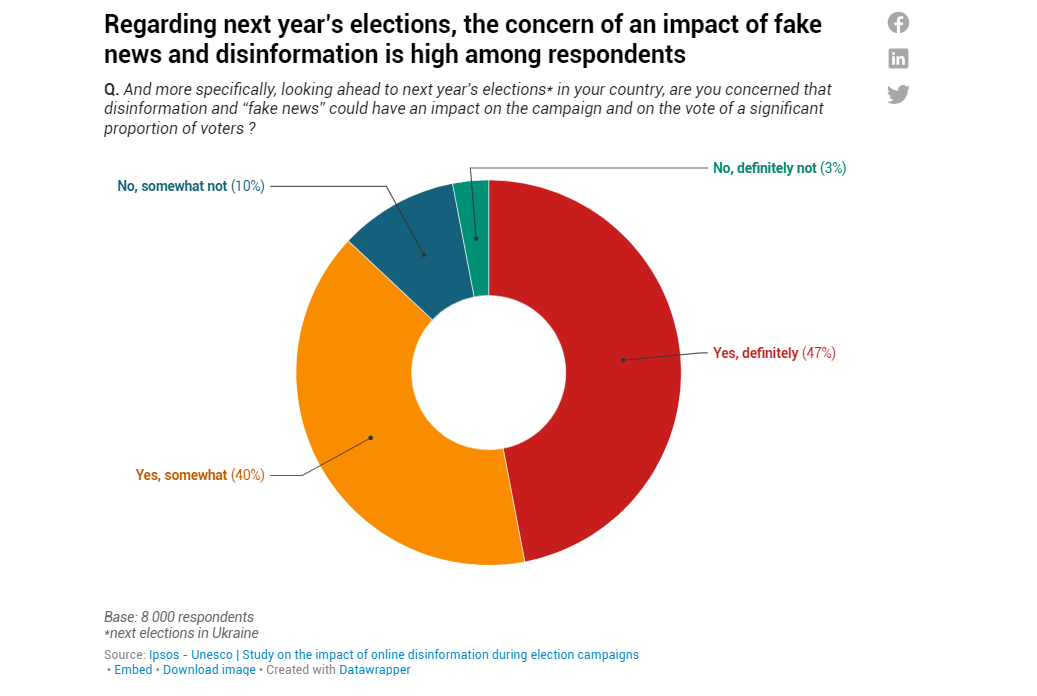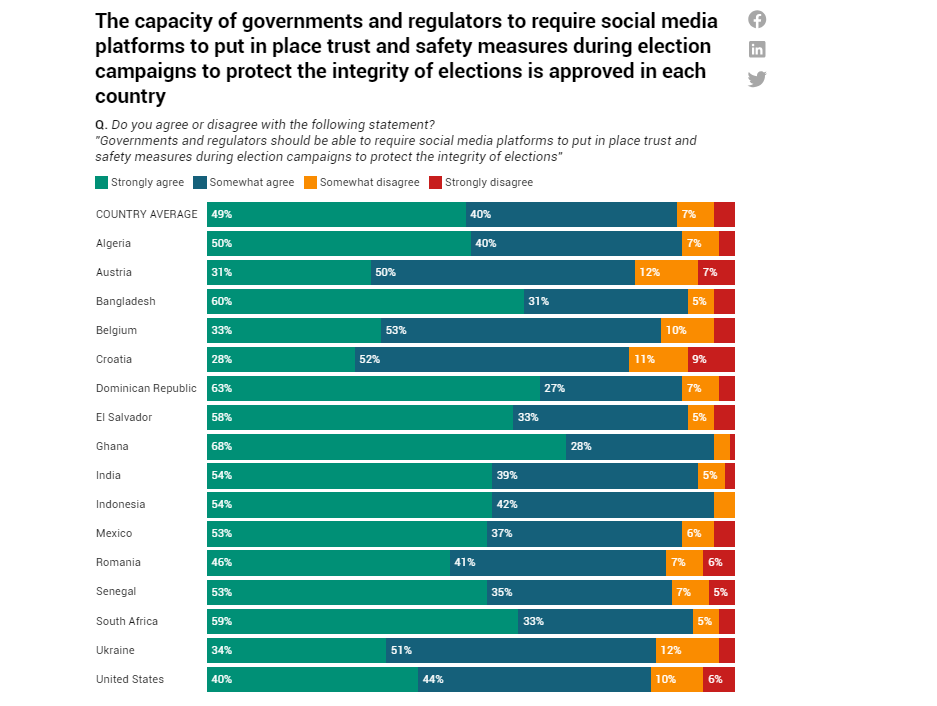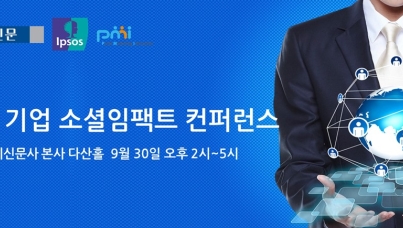Elections & social media: the battle against disinformation and trust issues
Key findings
- 56% of internet users in the 16 countries surveyed frequently use social media as their primary source of news, surpassing television at 44%.
- Trust in traditional media remains high, with 66% of those surveyed trusting television news, 63% trusting radio news, and 61% trusting print media news.
- Internet users experience a high prevalence of disinformation on social media, with 68% indicating that disinformation is most widespread there.
- 87% of respondents expressed concern about the impact of disinformation on upcoming elections in their country, with 47% being "very concerned".
- 67% of internet users have encountered hate speech online, with a majority believing it's most prevalent on Facebook (58%).
- There's a strong call for regulation, with 88% believing that both governments and regulatory bodies, and social media platforms (90%) should address disinformation and hate speech issues.
- A majority of internet users (89%) support the idea that governments and regulators should enforce trust and safety measures on social media platforms during election campaigns.
- Only 48% of surveyed citizens have reported online content related to disinformation in the context of an election campaign.
Social media as a primary news source
The use of social media as a daily source of information has rapidly grown over the past 15 years, to the point of now surpassing print media, radio, and even television.
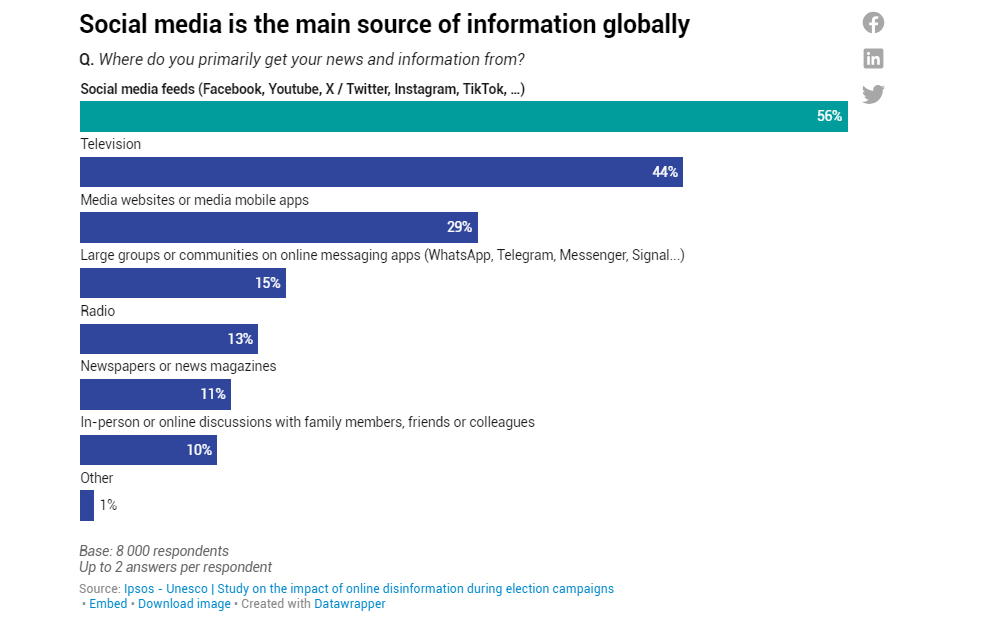
On average in the 16 countries surveyed, 56% of internet users frequently use social media to stay informed about current events, far ahead of television (44%). However, it is worth noting that differences exist among population groups: television is the primary source in the most developed countries (55% compared to 37% for social media), while it lags significantly in countries with high (42% vs 63%) or medium/low levels of Human Development Index (HDI) (37% vs 68%). Unsurprisingly, those under 35 are also much more inclined to use social media for information compared to those aged 55 and older (67% compared to 31%).
Trust in traditional media during elections
We also note that television is used somewhat more for information during election campaigns. Indeed, traditional media, especially television, are the most trusted sources in terms of credibility and quality of the news they provide to the public.
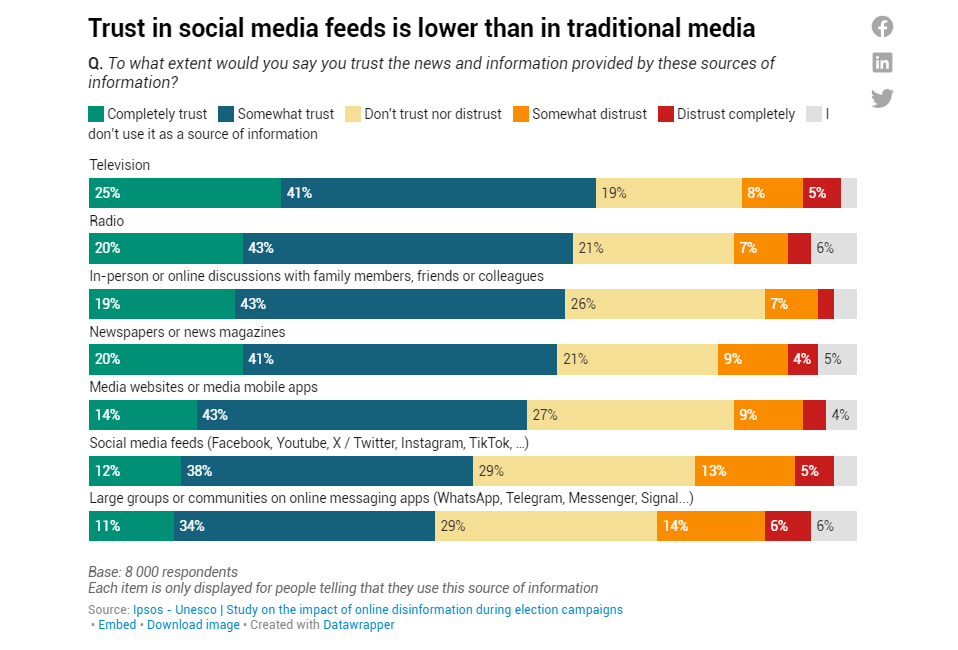
Overall, 66% of those surveyed have trust in the news broadcast on television, 63% in radio news, and 61% in print media news, compared to only 50% for news gathered from social media. Here again, there are major differences between countries, with confidence in all the sources of information surveyed much lower in affluent countries than in the developing ones.
Concerns about disinformation on social media
The significance of social media as a source of information, especially during election campaigns, is even more crucial given that citizens believe disinformation is highly prevalent there.
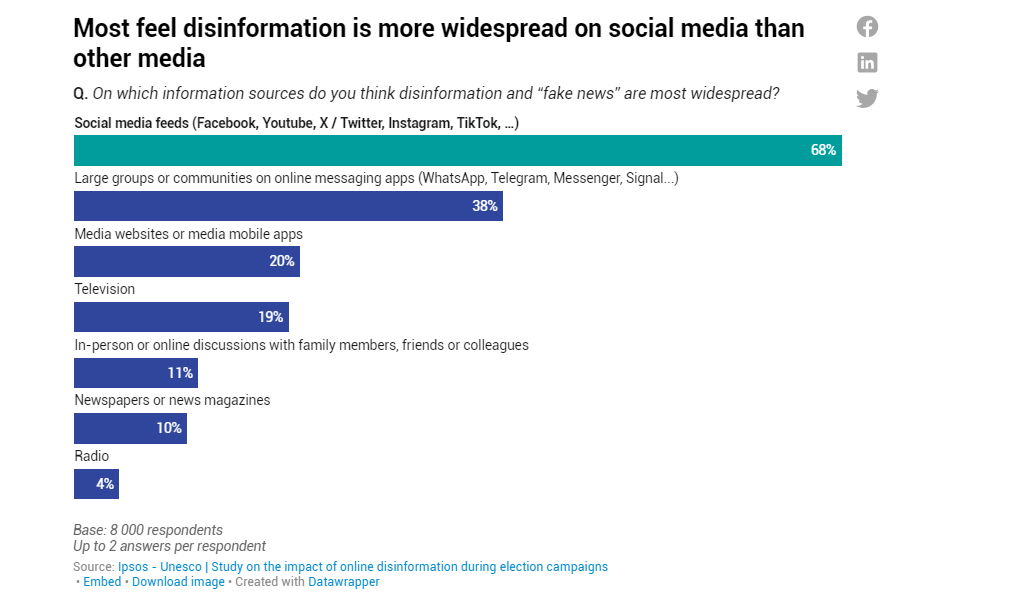
Across all 16 countries, 68% of internet users told us that social media is the place where disinformation is most widespread, far ahead of groups on online messaging apps (38%) and media websites/apps (20%). This sentiment is overwhelmingly prevalent in all countries, age groups, social backgrounds, and political preferences. This is even more important as citizens feel that the issue of disinformation is a real threat: 85% express concern about the impact and influence of disinformation on their fellow citizens, a figure that reaches 88% in countries with high levels of HDI and 90% in those with medium/low HDI. They are even more inclined (87%) to believe that this phenomenon has already had a major impact on the political life in their country.
Fear of disinformation impact on elections
Moreover, the same percentage (87%) is worried about the impact of disinformation on the upcoming elections in their country with 47% being "very concerned" (this figure reaches 63% among those who describe themselves as "very interested" in politics).
The prevalence of hate speech online
In addition to disinformation, the phenomenon of hate speech is also widespread according to the public: 67% of internet users have encountered it online (including 74% of those under 35).
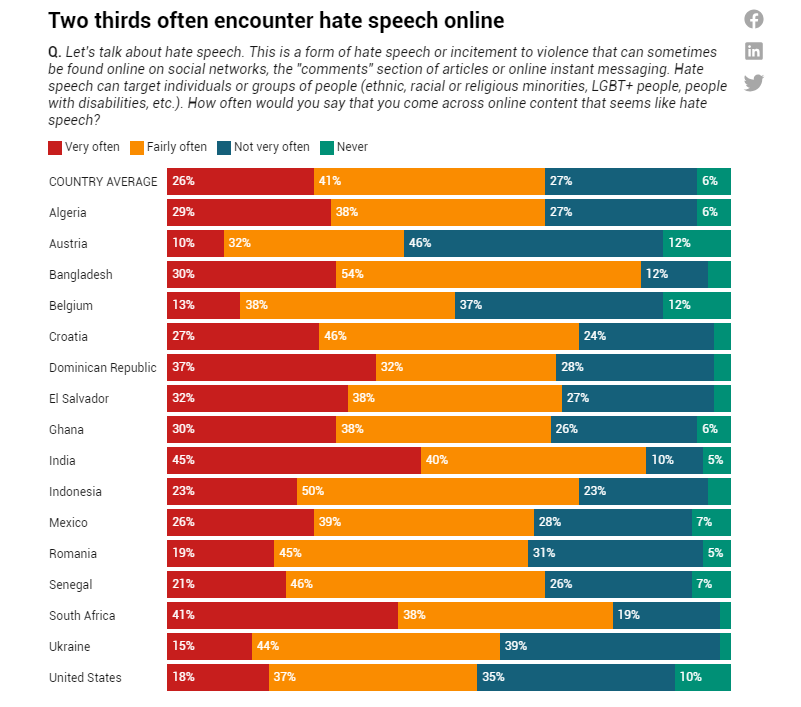
They overwhelmingly believe that hate speech is most prevalent on Facebook (58%), followed by TikTok (30%), X (18%), and Instagram (15%). According to citizens, it is primarily LGBT+ people (33%) and ethnic or racial minorities who are victims of online hate speech in their country, although there are significant variations between countries.
Call for regulation and intervention
In this context, citizens strongly believe that the issues of disinformation and hate speech must be addressed by both governments and regulatory bodies (88%) and social media platforms themselves (90%). They even think, in similar proportions, that both these actors should play an "active role" (at 89% and 91%, respectively) in combating them during election campaigns. From this perspective, residents of countries with intermediate or low levels of HDI are even more inclined to desire a strong intervention from both public authorities and the private sector.
Public support for social media regulation
More specifically, an overwhelming majority of internet users agree with the idea that “governments and regulators should be able to require social media platforms to put in place trust and safety measures during election campaigns to protect the integrity of elections": 89% endorse this proposal, which garners consensus across all countries, age groups, social demographics, and political preferences. It's also worth noting that in the public's view, international organizations such as the UN or UNESCO can have a role to play in combating disinformation: 75% endorse this idea (with 83% in medium/low HDI countries), and 33% endorse it “strongly.“
Citizens' role in combating online disinformation
Finally, the study shows that while they are very aware of the problem, citizens themselves could take stronger actions to address the growing phenomenon of online disinformation. At this point, only 48% of them have already reported online content related to disinformation in the context of an election campaign, including 17% who have done so "often." In detail, those aged 18-34 (55%) and people who describe themselves as "very interested" in politics (55%) are significantly more likely to have already reported this type of content.
About UNESCOUNESCO works to promote freedom of expression online at a time when the digital ecosystem offers new opportunities but also multiplies challenges for freedom of expression. In September 2022, UNESCO started a global multistakeholder consultation to develop guidelines for regulating digital platform to safeguard freedom of expression, access to information, and other human rights, while dealing with content that can be permissibly restricted under internal human rights law and standards. The Guidelines outline a set of duties, responsibilities and roles for states, digital platforms, intergovernmental organizations, civil society, media, academia, the technical community and other stakeholders to achieve this goal. |
About this study
Survey conducted in 16 countries among representative samples of the national population of Internet users aged 18 and over in each country.
A total of 8 000 individuals were interviewed (500 per country) from 22nd August to 25th September. Each country was chosen because a national election is foreseen in 2024.

